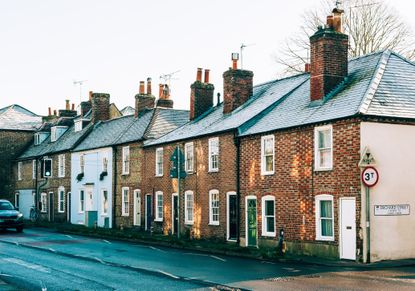House prices fall at fastest rate since 2011 - Halifax
High mortgage rates are having a knock-on impact on house prices despite signs of resilience


UK house prices recorded their biggest annual decline in more than a decade, according to lender Halifax, which recorded a 2.6% year-on-year decline in prices to the end of June.
The latest Halifax house price index – just one of many house price indexes - shows the average price of a home in the UK is now £285,932, around £8,000 less than the peak last August.
However, the index also showed house prices have risen 1.5% or £4,000, so far this year. Prices recovered in the first quarter following a sharp drop in the aftermath of the mini-budget.
Subscribe to MoneyWeek
Subscribe to MoneyWeek today and get your first six magazine issues absolutely FREE

Sign up to Money Morning
Don't miss the latest investment and personal finances news, market analysis, plus money-saving tips with our free twice-daily newsletter
Don't miss the latest investment and personal finances news, market analysis, plus money-saving tips with our free twice-daily newsletter
Higher mortgage rates are hitting house prices
The figures come amid soaring interest rates on mortgages, raising questions on both the affordability of homebuying and the knock-on consequences for the housing market.
“The resulting squeeze on affordability will inevitably act as a brake on demand, as buyers consider what they can realistically afford to offer. While there’s always a lag effect when rates go up, many existing mortgage holders with variable deals or rolling off fixed rates will likely face an increase in the next year,” says Kim Kinnaird, director at Halifax Mortgages.
“How deep or persistent the downturn in house prices will be remains hard to predict. With markets now forecasting a peak in Bank Rate of over 6%, the likelihood is that mortgage rates will remain higher for longer, and the squeeze on household finances will continue to put downward pressure on house prices over the coming year,” she adds.
But there are encouraging signs of the market’s resilience amid 13 consecutive interest rate rises since December 2021. The latest figures suggest some resilience in new build property prices, up by 1.9% annually, but the rate of growth has continued to slow.
Meanwhile, the number of mortgage applications “held up well throughout June, particularly from first-time buyers,” Kinnaird says, suggesting a “degree of stability in the face of economic uncertainty”.
Where are prices falling the most?
Average house prices are now falling on an annual basis in most parts of the UK, with the only exceptions being the West Midlands - an area that has seen a 1.5% rise. An average house in the area now costs £251,139.
There are also gains in Yorkshire & Humberside, up 0.2% to £203,674 and Northern Ireland, also up 0.2% to £186,856.
The south of England remains the area where house prices are facing the most downward pressure. A 3% annual fall in the South East was the largest since July 2011 with an average house now £384,106.
London recorded an annual decline of -2.6% to an average price of £533,057 - its weakest performance since October 2009. The fall represents a decline in value of £15,000 over the last year.
Welsh house prices recorded the UK’s first year-on-year fall since March 2012, with prices down by 1.8% to £215,183.
In Scotland, prices underwent the first annual contraction in three years, with prices down 0.1% to an average of £201,774.
What will happen to house prices in the future?
Kinnaird says how deep or persistent the downturn in house prices will be remains hard to predict.
“Consumer price inflation is likely to come down in the near term as energy and food prices look set to reverse their steep rises, but core inflation is clearly proving stickier than originally expected. With markets now forecasting a peak in Bank Rate of over 6%, the likelihood is that mortgage rates will remain higher for longer, and the squeeze on household finances will continue to put downward pressure on house prices over the coming year,” she says.
Alice Haine, personal finance analyst at BestInvest says echoes this view, saying: “With house price falls likely to accelerate from here, some borrowers may choose to raid their savings pots to cover high mortgage costs, while those locked into a low-cost product for some time yet could consider overpayments to reduce the hit further down the line.”
What’s going on with mortgages?
Forecasters have predicted interest rates to peak as high as 6.5% by next year, with the mortgage rates on offer from lenders climbing to new highs in recent days - both two and five-year fixed rates now averaging above the 6% mark.
Haine says some borrowers, particularly first time buyers, may be swayed by “radical solutions” such as longer mortgage terms, 100% mortgages and downgrading the size and location of the property they purchase to ensure they can afford repayments.
“For others, rapidly rising borrowing costs may feel too alarming, encouraging them to shelve buying plans altogether or hold out until property prices fall further,” she says.
The 800,000 homeowners whose fixed rate deals are expiring in the second half of this year now face the “remortgage nightmare,” Haine says, with lenders offering sky-high rates, potentially costing homeowners more than £7,000 per year.
“As the mortgage turmoil deepens and buyers emerging from cheap fixes taken out before the current cycle of interest rate hikes began face a significant jump in costs, households have difficult decisions to make.”
“A good independent mortgage broker can help them decide whether a variable or fixed-rate product will deliver the best value and whether locking in a two-year or five-year fix is the right strategy to take,” she adds.
Tom is a journalist and writer with an interest in sustainability, economic policy and pensions, looking into how personal finances can be used to make a positive impact.
He graduated from Goldsmiths, University of London, with a BA in journalism before moving to a financial content agency.
His work has appeared in titles Investment Week and Money Marketing, as well as social media copy for Reuters and Bloomberg in addition to corporate content for financial giants including Mercer, State Street Global Advisors and the PLSA. He has also written for the Financial Times Group.
When not working out of the Future’s Cardiff office, Tom can be found exploring the hills and coasts of South Wales but is sometimes east of the border supporting Bristol Rovers.
-
-
 Top-quality small companies with big scope for long-term growth
Top-quality small companies with big scope for long-term growthA professional investor tells us where he’d put his money. This week: Dr Gareth Blades, analyst at Amati Global Investors, highlights three favourites.
By Nicole García Mérida Published
-
 Starling Bank hikes fixed savings rate to 5.25%
Starling Bank hikes fixed savings rate to 5.25%Starling Bank has hiked the rate on its fixed savings which has shot up from 3.25% to 5.25% - but how does it compare to the rest of the market?
By Vaishali Varu Published

